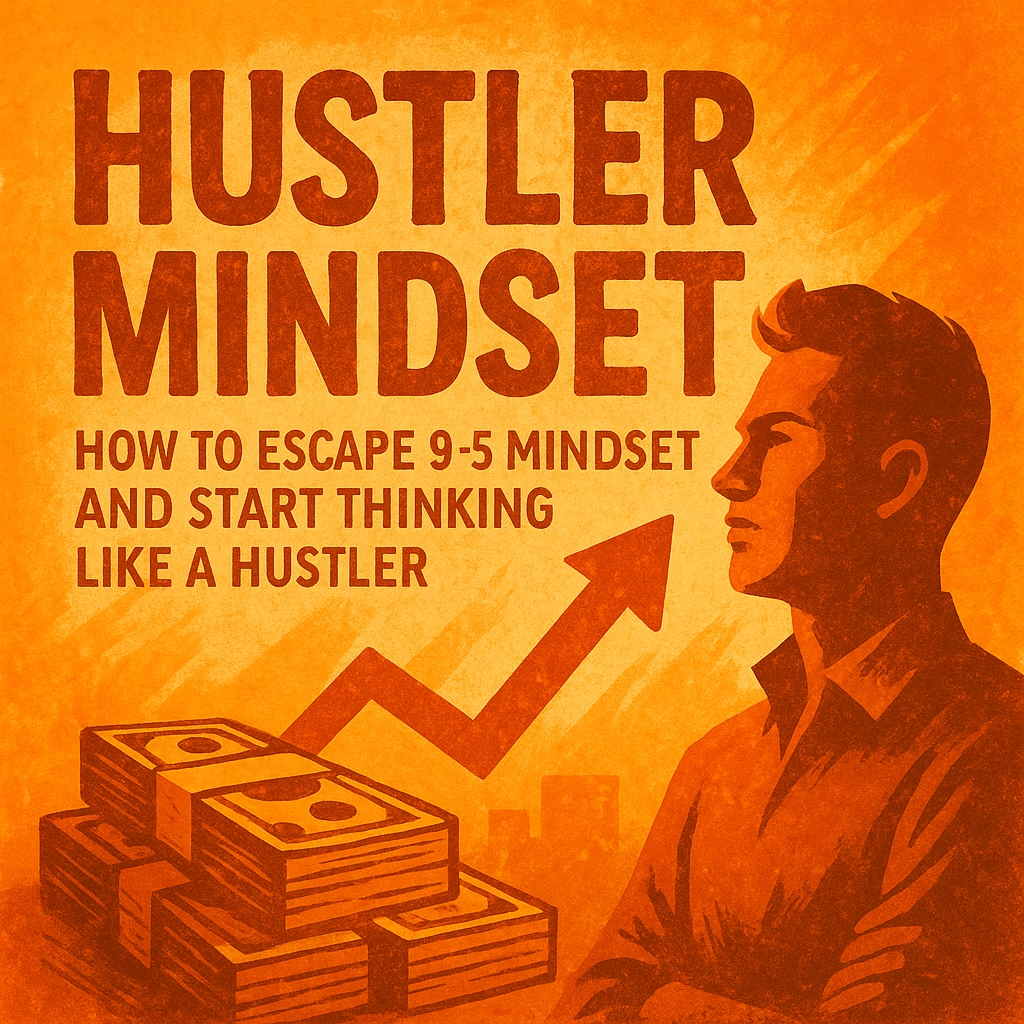"Better Every Day For You" -NeoKalon
Hustler Mindset: How to Escape 9-5 Mindset and Start Thinking Like a Hustler

We live in a world where the 9–5 grind is often seen as the “safe” path. Go to school, get a degree, get a job, work your way up, retire at 65. That’s the script. But deep down, you know something doesn’t sit right with it. There’s a part of you that wants more — not just more money, but more freedom, impact, and control over your own life. That’s where the hustler mindset kicks in.
Escaping the 9–5 mindset isn’t about hating jobs. It’s about rejecting the limitations that come with trading your time for a fixed paycheck. A hustler doesn’t wait for permission, doesn’t wait for Friday, and sure as hell doesn’t wait until retirement to enjoy life. A hustler builds, creates, risks, and adapts — not someday, but now.
Here’s how to start making that shift:
1. Stop Thinking in Paychecks — Start Thinking in Value
The paycheck mindset limits your earning potential by tying your income directly to time. You work one hour, you get paid once. That’s it. No matter how good you are or how hard you work, you’re locked into a system that caps your worth based on hours or contracts.
Hustlers break free from this model by focusing on value creation. They build things that solve real problems — whether it’s a product, service, or brand. They understand that the marketplace doesn’t care how many hours you work — it cares how much value you bring. This mindset shift is foundational. Instead of asking “How much will I be paid?”, ask “What is the real impact of what I’m doing?”
💡 Implementation Step: Look at your current skills and ask: “How can I package this into something people will pay for?” Start offering it as a service, product, or content. Start small, improve fast, and scale.
2. Take Ownership of Your Time
When you work a traditional job, someone else decides when you wake up, when you take breaks, and when your day ends. The structure is pre-built. While that may feel safe, it also means you’re outsourcing control of your life.
Hustlers reverse this. They take full ownership of every hour and make their schedule serve their goals — not someone else’s. Time isn’t just spent — it’s invested. They create habits, avoid distractions, and build structure that supports freedom, not just routine.
⏱️ Implementation Step: Do a 3-day time audit. Write down everything you do hour by hour. Then cut the waste and plug in focused hustle time. Make every hour count — even if it’s just 1–2 hours of real creation per day.
3. Develop Obsession-Level Discipline
Discipline is the engine that powers the hustle. Motivation is unreliable — it fades. But discipline? That’s built like a muscle. Hustlers know they won’t always feel like working — they show up anyway. They turn routine into ritual and make consistency their secret weapon.
Discipline means doing the work even when the excitement fades. It’s the ability to execute whether you’re inspired or not. That’s where the growth lives — in the moments you push through the resistance.
🔁 Implementation Step: Build a non-negotiable daily routine. Choose 2–3 habits tied to your hustle (writing, editing, researching, selling). Do them daily, without fail. Track your streak. Discipline builds identity — and momentum.
4. Get Comfortable Being Uncomfortable
Most people avoid discomfort. Hustlers embrace it. They understand that growth lives outside the comfort zone. Taking risks, dealing with rejection, and doing the scary things are the only way forward.
The predictable paycheck might feel secure, but it often comes at the cost of your potential. You weren’t built to coast — you were built to build.
⚔️ Implementation Step: Do one uncomfortable thing every week. That could mean cold-calling a client, posting your ideas online, or pitching your service. Let discomfort become your compass — it points toward growth.
5. Stack Skills, Not Just Savings
Savings are great — but skills create freedom. A hustler constantly levels up. While others stash cash for short-term comfort, hustlers invest in skills that unlock long-term leverage.
Copywriting. Content creation. Sales. Negotiation. Tech. Branding. Learn enough of each to be dangerous — or unstoppable.
📚 Implementation Step: Choose one high-income skill to master in the next 3 months. Study it daily, apply it in real projects, and improve fast. The more skills you stack, the fewer limits you face.
6. Think Like an Owner
This is the leap that ties everything together: stop thinking like an employee, and start thinking like an owner. Owners don’t wait for instructions. They solve problems, make decisions, and take full responsibility.
Everything they touch — their business, their brand, their time — becomes a reflection of who they are. If something fails, they own it. If something wins, they grow it.
🏗️ Implementation Step: Start building an asset. A blog, a YouTube channel, a product, a service — something that grows with time. Focus on systems, not just tasks. Think long-term. Think legacy.
🚀 Final Wrap-Up: Start Now, Start Small, Stay Relentless
You don’t have to quit your job tomorrow. But you do have to quit thinking like you’ll be saved by a promotion or a pension. The hustler mindset doesn’t wait — it builds. One action at a time. One win at a time.
So here’s your quick-action checklist:
✅ Identify a skill you can monetize
✅ Audit your time and reclaim your hours
✅ Build a daily habit system that locks in discipline
✅ Face one discomfort per week — and grow through it
✅ Pick one high-value skill and master it
✅ Build your first digital or real-life asset — and treat it like your future depends on it
No one’s going to do this for you.
No one’s going to give you the perfect time.
But if you start now — you just might create a life you never thought was possible.
Recommended Reads & Related Resources
To help you go even deeper on your journey to living without limitations, here are some powerful books and articles we recommend. These resources can expand your mindset, build discipline, and inspire lasting change.
📚 Books to Read:
- Atomic Habits by James Clear – A practical guide on building systems and making small changes that lead to big results.
- The Subtle Art of Not Giving a F*ck by Mark Manson – A brutally honest book on letting go of unimportant things and living life on your own terms.
- Can’t Hurt Me by David Goggins – A powerful story of resilience, mental toughness, and pushing past limits.
- Ego Is the Enemy by Ryan Holiday – Learn how to conquer your inner resistance and lead with humility and strength.
Explore More & Stay Connected
If you found this post helpful or inspiring, make sure to check out our other articles on personal growth, mindset, and building a life of purpose. Every blog is crafted to help you break free from limitations and become the person you’re meant to be.
👉 Browse more blog posts here
👉 Return to the NeoKalon homepage
We update regularly, so don’t miss out on fresh content designed to challenge your mindset and fuel your journey. Your transformation starts here — one step, one thought, one habit at a time.
And of course don’t forget to leave a comment of your opinion and thoughts about this post. And thanks again for reading. Until next time.




This is a thought-provoking perspective on breaking free from the paycheck mindset. I agree that relying solely on hourly wages can limit growth, but isn’t entrepreneurship equally demanding? Learning skills like copywriting and branding seems essential, but where does one even start without overwhelming themselves? The idea of taking ownership of failures and successes is empowering, yet it feels like a lonely path at times. The recommended books and articles are a nice touch, but do they truly offer practical steps or just theory? I wonder if this mindset shift is feasible for everyone, or if it’s tailored to specific personalities. What’s your take on balancing risk and stability while pursuing this lifestyle?
Great points—you’re absolutely right that entrepreneurship, while freeing, comes with its own pressures. It’s not an escape from hard work, but a shift in where that effort goes. The grind doesn’t disappear—it just becomes yours. And yes, skills like copywriting, branding, and marketing are essential, but the key is to start small. Pick one skill and commit to learning it through free resources or low-cost courses. Over time, you build momentum.
The path can feel lonely, especially when you’re doing things differently from your peers. That’s why finding a community—online or offline—of people with similar goals can make a big difference. As for the books and articles, some are more motivational than practical, but the best ones offer both mindset and action steps. It’s worth being selective.
And no, this lifestyle isn’t only for a certain personality—it’s for anyone willing to accept responsibility and navigate uncertainty. Balancing risk and stability is personal: some keep a part-time job while building their business; others go all in. The important thing is to be intentional, not impulsive. Test, reflect, adjust. It’s not easy, but it’s worth it if you’re serious about freedom and growth.
This is such an inspiring read! I completely agree that the paycheck mindset can be limiting, but shifting to entrepreneurship feels like a huge leap. The idea of owning every aspect of your work is empowering, but it also sounds overwhelming. How do you balance the freedom of entrepreneurship with the discipline it requires? I’m curious, what’s the first step you’d recommend for someone just starting to explore these skills? Also, do you think it’s possible to transition gradually, or is it better to dive in headfirst? I’d love to hear your thoughts on how to manage the risks involved. And finally, which of the recommended books or articles would you say is a must-read for beginners?
Absolutely love your thoughtful response—it shows you’re seriously reflecting on the journey, not just the destination. You’re right: entrepreneurship is empowering, but also challenging. It demands both freedom and structure, and finding that balance takes time and self-awareness.
To balance freedom with discipline, start by creating a simple routine—just 1–2 non-negotiable daily tasks (like writing for 30 minutes or learning 1 new skill). Discipline isn’t about strict control; it’s about consistency in what matters.
As for the first step, I’d recommend choosing one skill that excites you—copywriting, digital design, or even social media marketing—and commit to learning and practicing it for 30 days. This builds confidence and momentum without overwhelming you.
You can absolutely transition gradually. In fact, that’s often smarter. Start a small side hustle while still working your job or studying. Use that time to learn, fail safely, and find what aligns with you. Diving in headfirst is powerful only if you’re prepared to handle the pressure.
Managing risk is about limiting downside while increasing upside. Keep expenses low. Learn fast. Don’t aim for perfection—aim for progress. You don’t need to be fearless, just willing.
Must-read for beginners?
Start with “The $100 Startup” by Chris Guillebeau – it’s practical, inspiring, and full of real stories. Then “Show Your Work” by Austin Kleon to build your creative courage. If you’re thinking long-term mindset shift, “Ego is the Enemy” by Ryan Holiday is gold.
You’re clearly on the right track—keep asking these deep questions. That’s where real change begins.